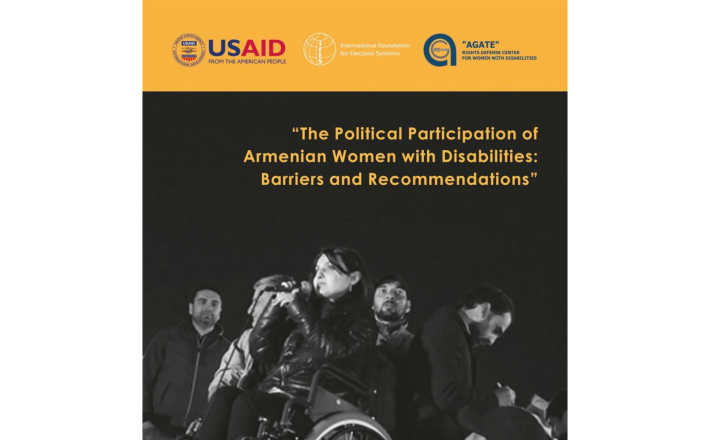Agate Report: The political participation of Armenian women with disabilities: barriers and recommendations
Source: IFES
The Agate Rights Defense Center for Women with Disabilities, with the support of the International Foundation for Electoral Systems (IFES) and the United States Agency for International Development, has published new research on the barriers to and opportunities for political participation of women with disabilities in Armenia. The Political Participation of Armenian Women with Disabilities: Barriers and Recommendations provides insights into the challenges that hinder participation of Armenian women with disabilities and identifies the means to address them. To conduct the research, Agate utilized IFES’ Intersectionality Assessment Framework, organizing participatory focus group discussions with men and women with disabilities and their peers from urban and rural areas of Armenia.
Armenian women with disabilities identified various attitudinal, communication, environmental and institutional barriers to participation in formal political spaces and in the recent demonstrations that led to a change of political leadership. For example, when asked if they thought their right to vote was ensured by the state, 58 percent of women with disabilities in the focus groups answered “strongly disagree” or “rather disagree”, compared to 24 percent of other respondents, revealing a lack of implementation of the law. Women with hearing disabilities noted that they did not participate in political campaigns because they did not have access to information about candidates and the process.
The report found that women with disabilities are not participating in formal political spaces equally with their peers. The attitude of the public, Armenian patriarchal society and family indifference also increase the likelihood of women with disabilities becoming marginalized from political processes. Even so, it revealed that building confidence in women with disabilities and raising awareness of rights would provide a critical foundation to overcoming their inner fears and building their capacity to participate as voters, candidates, observers, and other leaders in political life. Finally, when women with disabilities have the opportunity to detect and assess discrimination, government stakeholders should involve them in policymaking and legislation that concerns them.
Click here to see the report.

The Agate Rights Defense Center for Women with Disabilities, with the support of the International Foundation for Electoral Systems (IFES) and the United States Agency for International Development, has published new research on the barriers to and opportunities for political participation of women with disabilities in Armenia. The Political Participation of Armenian Women with Disabilities: Barriers and Recommendations provides insights into the challenges that hinder participation of Armenian women with disabilities and identifies the means to address them. To conduct the research, Agate utilized IFES’ Intersectionality Assessment Framework, organizing participatory focus group discussions with men and women with disabilities and their peers from urban and rural areas of Armenia.
Armenian women with disabilities identified various attitudinal, communication, environmental and institutional barriers to participation in formal political spaces and in the recent demonstrations that led to a change of political leadership. For example, when asked if they thought their right to vote was ensured by the state, 58 percent of women with disabilities in the focus groups answered “strongly disagree” or “rather disagree”, compared to 24 percent of other respondents, revealing a lack of implementation of the law. Women with hearing disabilities noted that they did not participate in political campaigns because they did not have access to information about candidates and the process.
The report found that women with disabilities are not participating in formal political spaces equally with their peers. The attitude of the public, Armenian patriarchal society and family indifference also increase the likelihood of women with disabilities becoming marginalized from political processes. Even so, it revealed that building confidence in women with disabilities and raising awareness of rights would provide a critical foundation to overcoming their inner fears and building their capacity to participate as voters, candidates, observers, and other leaders in political life. Finally, when women with disabilities have the opportunity to detect and assess discrimination, government stakeholders should involve them in policymaking and legislation that concerns them.
Click here to see the report.